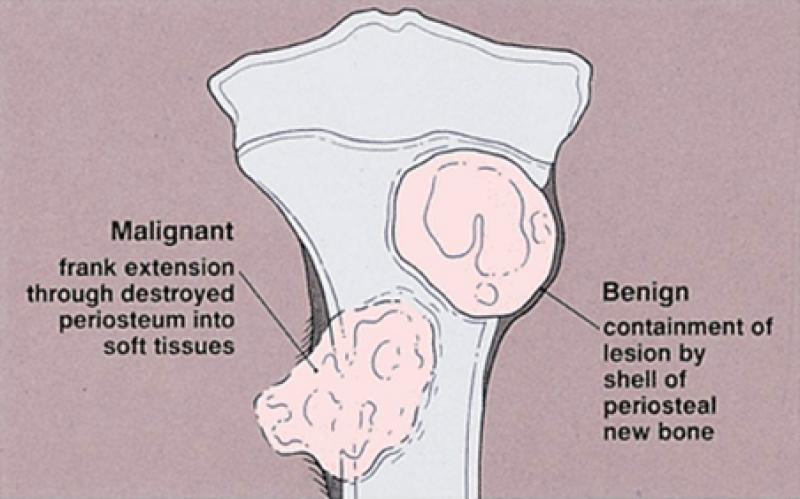How benign tumors in human can be cured?
A diagnosis of a benign tumor can be unsettling, but it's important to remember that "benign" means non-cancerous. Unlike malignant tumors, benign tumors do not spread to other parts of the body. While many benign tumors are harmless and require no treatment, others may need to be addressed. The decision to treat a benign tumor is highly individualized and depends on several factors.
How Are Benign Tumors Treated in Humans?
Benign tumor treatment is not a one-size-fits-all approach. In many cases, a doctor may recommend "watchful waiting," which involves actively monitoring the tumor with regular check-ups and imaging tests. This is a common strategy for tumors that are small, not causing symptoms, and are in a location where they are unlikely to cause problems.
If a tumor starts to grow or cause symptoms, treatment options typically include:
Surgery: This is often the most common and effective treatment for benign tumors. The goal is to remove the tumor completely without damaging the surrounding tissue.
Medication: For certain types of benign tumors, like those that produce excess hormones, medication can be used to shrink the tumor or manage symptoms.
Radiation Therapy: This treatment uses high-energy beams to destroy tumor cells. It's often used for tumors that are difficult to remove with surgery, such as those in the brain, or to shrink a tumor before surgery.
Radiofrequency Ablation (RFA): This minimally invasive procedure uses heat generated by radio waves to destroy tumor cells. It's an option for some tumors that are located in the liver, kidney, or other organs.
What Non-Surgical Treatments Are Available for Benign Tumors?
Non-surgical treatments are becoming more common, offering alternatives to traditional surgery. The best option depends on the type, location, and size of the tumor.
Medication: Pituitary adenomas, for example, can often be treated with medication to control hormone production and shrink the tumor.
Radiation Therapy: Focused radiation, like stereotactic radiosurgery, is a powerful tool for treating benign brain tumors. It delivers a high dose of radiation to a precise area, minimizing damage to surrounding healthy tissue.
Radiofrequency Ablation (RFA): For benign tumors in the liver, kidney, or bone, RFA can be a highly effective treatment. The procedure involves inserting a thin needle into the tumor and using radio waves to heat and destroy the tissue.
Immunotherapy: While primarily used for cancer, immunotherapy is being explored as a potential treatment for certain benign tumors. It works by stimulating the body's own immune system to target and destroy tumor cells.
When Is Surgery Necessary for Benign Tumors?
Surgery is the gold standard for treating many benign tumors, but it's usually reserved for specific situations. Doctors may recommend surgery if a benign tumor:
Causes Symptoms: If the tumor is causing pain, pressure, or other symptoms due to its size or location, surgical removal can provide relief. For instance, a brain tumor, even if benign, can cause life-threatening symptoms by putting pressure on critical brain structures.
Grows Rapidly: A benign tumor that is growing quickly may need to be removed to prevent it from causing future problems.
Is a Risk to Become Malignant: Some benign tumors, like certain types of colon polyps, have the potential to become cancerous over time. In these cases, removal is often a preventative measure.
Affects Organ Function: A tumor that is interfering with the function of an organ or pressing on a nerve or blood vessel will likely need to be removed.
Is for Cosmetic Reasons: A benign tumor on the skin, such as a lipoma, may be removed for cosmetic reasons if it is bothersome to the patient.
How Effective Are Current Therapies for Benign Tumors?
The effectiveness of benign tumor therapies is generally very high.
Surgery is highly effective, and most benign tumors that are completely removed do not grow back. The success rate is particularly high for tumors that have a distinct border and can be fully excised.
Radiation Therapy is also very effective, especially for tumors that are difficult to reach with surgery. It can successfully shrink or eliminate tumors, preventing further growth and symptoms.
Medications can effectively manage symptoms and even shrink certain tumors, providing long-term control without the need for invasive procedures.
The outlook for most people with benign tumors is excellent. The key to a good outcome is a proper diagnosis and an individualized treatment plan tailored to the specific tumor and patient.
What Are the Risks of Leaving Benign Tumors Untreated?
While many benign tumors can be safely monitored, leaving some untreated can pose significant risks. These risks are not due to cancer, but rather to the tumor's physical presence and growth.
Pressure on Nerves and Organs: A growing benign tumor can press on surrounding nerves, blood vessels, or organs. This can lead to pain, loss of function, or a variety of other symptoms, depending on the location of the tumor. For example, a benign brain tumor can cause headaches, seizures, or vision problems.
Hormonal Imbalances: Benign tumors in endocrine glands, like the thyroid or pituitary, can cause the body to produce an excess of hormones, leading to serious health issues.
Risk of Malignancy: Although it's rare, some types of benign tumors have a small chance of becoming malignant over time. This is why active surveillance is crucial for certain tumors.
Discomfort and Reduced Quality of Life: Even if a tumor isn't life-threatening, its size or location can cause physical discomfort or a cosmetic concern that significantly impacts a person's quality of life.
A diagnosis of a benign tumor can be unsettling, but it's important to remember that "benign" means non-cancerous. Unlike malignant tumors, benign tumors do not spread to other parts of the body. While many benign tumors are harmless and require no treatment, others may need to be addressed. The decision to treat a benign tumor is highly individualized and depends on several factors.
How Are Benign Tumors Treated in Humans?
Benign tumor treatment is not a one-size-fits-all approach. In many cases, a doctor may recommend "watchful waiting," which involves actively monitoring the tumor with regular check-ups and imaging tests. This is a common strategy for tumors that are small, not causing symptoms, and are in a location where they are unlikely to cause problems.
If a tumor starts to grow or cause symptoms, treatment options typically include:
Surgery: This is often the most common and effective treatment for benign tumors. The goal is to remove the tumor completely without damaging the surrounding tissue.
Medication: For certain types of benign tumors, like those that produce excess hormones, medication can be used to shrink the tumor or manage symptoms.
Radiation Therapy: This treatment uses high-energy beams to destroy tumor cells. It's often used for tumors that are difficult to remove with surgery, such as those in the brain, or to shrink a tumor before surgery.
Radiofrequency Ablation (RFA): This minimally invasive procedure uses heat generated by radio waves to destroy tumor cells. It's an option for some tumors that are located in the liver, kidney, or other organs.
What Non-Surgical Treatments Are Available for Benign Tumors?
Non-surgical treatments are becoming more common, offering alternatives to traditional surgery. The best option depends on the type, location, and size of the tumor.
Medication: Pituitary adenomas, for example, can often be treated with medication to control hormone production and shrink the tumor.
Radiation Therapy: Focused radiation, like stereotactic radiosurgery, is a powerful tool for treating benign brain tumors. It delivers a high dose of radiation to a precise area, minimizing damage to surrounding healthy tissue.
Radiofrequency Ablation (RFA): For benign tumors in the liver, kidney, or bone, RFA can be a highly effective treatment. The procedure involves inserting a thin needle into the tumor and using radio waves to heat and destroy the tissue.
Immunotherapy: While primarily used for cancer, immunotherapy is being explored as a potential treatment for certain benign tumors. It works by stimulating the body's own immune system to target and destroy tumor cells.
When Is Surgery Necessary for Benign Tumors?
Surgery is the gold standard for treating many benign tumors, but it's usually reserved for specific situations. Doctors may recommend surgery if a benign tumor:
Causes Symptoms: If the tumor is causing pain, pressure, or other symptoms due to its size or location, surgical removal can provide relief. For instance, a brain tumor, even if benign, can cause life-threatening symptoms by putting pressure on critical brain structures.
Grows Rapidly: A benign tumor that is growing quickly may need to be removed to prevent it from causing future problems.
Is a Risk to Become Malignant: Some benign tumors, like certain types of colon polyps, have the potential to become cancerous over time. In these cases, removal is often a preventative measure.
Affects Organ Function: A tumor that is interfering with the function of an organ or pressing on a nerve or blood vessel will likely need to be removed.
Is for Cosmetic Reasons: A benign tumor on the skin, such as a lipoma, may be removed for cosmetic reasons if it is bothersome to the patient.
How Effective Are Current Therapies for Benign Tumors?
The effectiveness of benign tumor therapies is generally very high.
Surgery is highly effective, and most benign tumors that are completely removed do not grow back. The success rate is particularly high for tumors that have a distinct border and can be fully excised.
Radiation Therapy is also very effective, especially for tumors that are difficult to reach with surgery. It can successfully shrink or eliminate tumors, preventing further growth and symptoms.
Medications can effectively manage symptoms and even shrink certain tumors, providing long-term control without the need for invasive procedures.
The outlook for most people with benign tumors is excellent. The key to a good outcome is a proper diagnosis and an individualized treatment plan tailored to the specific tumor and patient.
What Are the Risks of Leaving Benign Tumors Untreated?
While many benign tumors can be safely monitored, leaving some untreated can pose significant risks. These risks are not due to cancer, but rather to the tumor's physical presence and growth.
Pressure on Nerves and Organs: A growing benign tumor can press on surrounding nerves, blood vessels, or organs. This can lead to pain, loss of function, or a variety of other symptoms, depending on the location of the tumor. For example, a benign brain tumor can cause headaches, seizures, or vision problems.
Hormonal Imbalances: Benign tumors in endocrine glands, like the thyroid or pituitary, can cause the body to produce an excess of hormones, leading to serious health issues.
Risk of Malignancy: Although it's rare, some types of benign tumors have a small chance of becoming malignant over time. This is why active surveillance is crucial for certain tumors.
Discomfort and Reduced Quality of Life: Even if a tumor isn't life-threatening, its size or location can cause physical discomfort or a cosmetic concern that significantly impacts a person's quality of life.
Ultimately, the decision to treat a benign tumor is a careful balance of the risks of the tumor itself versus the risks and benefits of the available treatments. A doctor will work with you to create a plan that ensures your long-term health and well-being.













